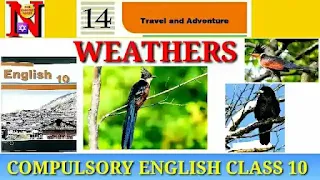 |
| Neb English Notes |
Unit 14 Class 10 English
Exercise & Grammar
Weathers
A. Find the words from the poem that are similar in meaning to the following words/phrases.
a. a brief and usually light fall of rain
》showers
b. sings
》bills
c. young women
》maid
d. to tumble about; throw into disorder
》betumble
e. baby birds
》nestlings
f. dislikes
》shuns
g. a dull greyish-brown colour
》duns
h. beat or sound with a strong, regular rhythm
》throb
i. small rivers: streams
》rivulets
B. Answer these questions.
a. What do the nestlings do in the spring?
Answer:
The nestlings fly in the spring.
b. What does the nightingale do?
Answer:
The nightingale bills (sings) his best.
c. How do the girls come out in spring?
Answer:
The girls come out in spring by dressing sprig-muslin.
d. What plan do people make?
Answer:
People make plan to visit different places in the south and west.
e. What happens to beeches in winter?
Answer:
Beeches turn brown and dun (a brownish grey colour) in winter.
f. Where do rooks go? Why do they migrate?
Answer:
Rooks go to their homes or nests. They migrate because of a variety of reasons. Their migration is especially for their successful survival and reproduction.
g. Does the poet enjoy the winter or the spring? Why?
Answer:
The poet enjoys the spring weather. It is because he has presented his enjoyment through his repetitive phrase "And so do I". This phrase suggests that he also enjoys the spring same as cuckoo, nestlings, nightingale, maids, and citizens who dream of the south and west.
CLICK HERE 👇 TO READ
ADVERTISEMENT/ VACANCY ANNOUNCEMENT SET 1 TO 23 (IMPORTANT FOR SEE PREPARATION)
C. Complete the interpretation of the poem using suitable words or phrases given below.
chestnut young girls south and west
Thomas Hardy severity sunny
beeches rooks hang
The poem ‘Weathers’ was composed by an English poet, Thomas Hardy. He talks about two different seasons which are the spring and the winter.
In the first stanza, the pleasant spring season is described. Cuckoo and nightingale feel good in this season. The light rain flows over the pointed leaves of chestnut tree. The poet is pleased as the nightingale sings at his best tune. People come out of their houses to enjoy the weather and the birds’ song. The young girls are seen in their fine clothes.
The people plan to visit different places of south and west. To an English person, the south and the west are associated with summer holiday destinations, where the weather at that time is often warm and sunny and many coastal towns provide welcoming accommodations and amusements. The poet likes this weather as it is liked by all the birds, animals, and humans as well.
In the second stanza, he talks about the winter's coldness and severity. All the natural beauty turns into dullness and discomfort. The cuckoo hates this weather. The beeches turn dry and brown as their leaves are threshed by the wind. The water drops hang from the wooden bars of gates. One can see some streams overflow as it has been raining a lot. The rooks fly to their homes as harshness of winter gradually grows. The poet dislikes the winter season because it is very cold and wet.
Symbolically the poet tries to state the bright and dark aspects of human life and the word ‘weathers’ indicates human life. The spring represents the bright whereas the winter represents the dark aspects of our life.
D. In which season would you like to travel? Why?
Answer:
I would like to travel in spring season. It is because this season is quite pleasant and better than other seasons in many ways. For me, the Spring season is the best season for the following reasons
1. The weather is warmer
2. There are more hours in the day to roam.
3. Sunshine is visible for longer hours.
4. Birds and animals emerge and are seen on different occasions.
5. Delicious seasonal products can be seen.
6. Time for spring cleaning and organizing.
7. Blooming flowers are seen everywhere.
8. Trees grow fresh leaves again and flourish greenery everywhere.
Grammar Il
A. Add suitable question tags.
a. I'd rather go travelling, wouldn't I?
b. Everything is okay, isn't it?
c. I shan't be in your position, shall I?
d. I don't think he'll come soon, won't he?
e. Let's not have cold drinks, shall we?
f. All is well, isn't it?
g. There is a coffee shop near the gate, isn't there?
h. Nothing was there, was it?
i. The car sped along the road, didn't it?
j. He's got a very peculiar voice, hasn't he?
k. Asmina, bring me your pen, will you?
l. Nawaraj seldom plays cards, does he?
m. Everyone will be satisfied with my job, won't they?
n. None met me last week, did they?
o. Everything is perishable, isn't it?
p. I think he's busy, isn't he?
Writing Il
Prepare a brochure of a touristic place in your locality. Include the following points:
i. Name of the place ii. Location
iii. Accessibility iv. Major attractions
v. Entry requirements (if any) vi. Contanct information
CLICK HERE 👇 TO READ
UNIT 15 CLASS 10 ENGLISH: PEOPLE AND PLACES
Thanks for Visiting my Website: Suraj Bhatt

Post a Comment